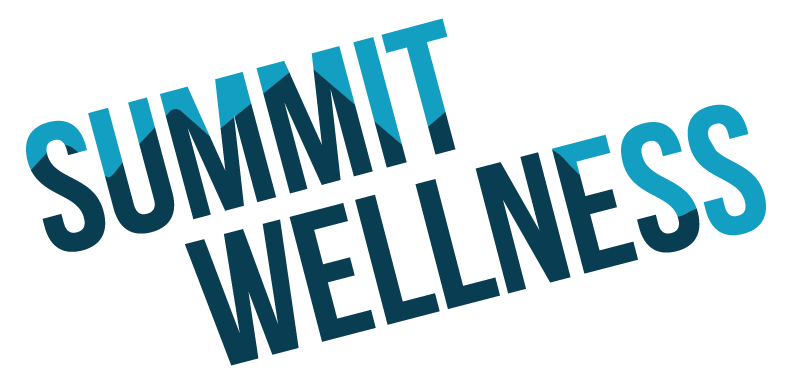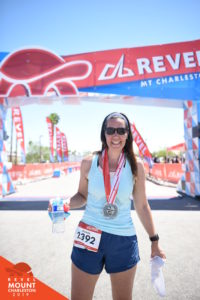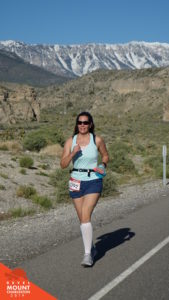
How I Ran My First Marathon and Didn’t Give Up
Had you known me before May 2018 you would have known that I am not a runner. Don’t get me wrong. I am fit. I go to the gym. I do cardio. I do resistance training. I love the outdoors. I hike. I snowshoe. I play hard. However, I don’t run.
In May of last year, my husband, who is a runner, had an idea to get a group of first time marathon runners together and give them the training and support they needed to successfully complete a marathon. He thought I would be the perfect person to help them with their training and nutrition. I was all about doing that without actually running but, as he pointed out, it would be so much more
effective if I ran my first marathon with them. So in a moment of weakness, I signed up for the Mt. Charleston marathon in Las Vegas, Nevada in April of 2019 — nearly a year in the distant future. It seemed so far away.
Did I mention that I don’t run? Never have. I began training. As fit as I thought I was, it was hard for me to run a lap, let alone a mile. I can walk for miles and miles, hours and hours, but running…There is more to it than just a mindset about running for me, I have exercise-induced asthma, so keeping my heart rate in a zone that keeps my breathing clear is something I had never learned to do effectively. I began by running as far as I could, then walking. Then running again. It wasn’t pretty. I walked far more than ran. Day after day, I kept at it.
As the summer went by, I ran. I was making progress, but it was slow. I felt discouraged often. In July, I was invited to run a half marathon. The furthest I had run to date was 5 miles. I signed up. I continued to run. The day of the half marathon came and the furthest I had run was 8 miles. That 8 miles had nearly killed me. I had to use my inhaler and it took a while to recover. 13.1 miles seemed impossible.
As I rode to the starting line I seriously questioned my judgment skills. My head was full of negative self-talk:
“What makes you think you are even capable of running a half marathon?”
“There is no way you are going to be able to finish.”
“You hate running. Why are you even doing this?”
“What is wrong with you? You are going to fail.”
And so on….
To top it off, I’d forgotten to bring my inhaler. Once you are on a bus though, there is only one way to get down. I crossed the start line and was on my way. The negative chatter in my brain was amplified by the negative signals from my body. My legs hurt. My feet hurt. My asthma began acting up. Why did I forget my inhaler? I continued to remind myself that I hated running and that even if I finished this race, there was not a chance I was going to finish a marathon no matter how hard I trained.
I crossed the finish line. I still don’t know how I did it. I quit in my mind a hundred times. If I had to have gone another step, I would not have made it. Instead of telling myself I had accomplished something really amazing, the self-defeating chatter continued. Knowing how hard a half-marathon had been, I desperately wanted to withdraw from the marathon.
It took me a couple of days to physically recover. It took me several weeks to emotionally recover. Nothing about that race had given me any reason to believe I could actually do a marathon.
I got back to running. I ran on the treadmill through the winter. I would get outside on nice days, but the cold air was hard on my lungs. I was now running enough each day that my body began complaining with intense chronic neck and back pain. I broke my back 30 years ago and running aggravated it. There was less running and more trips to the chiropractor, regular massage therapy and a personal trainer helping me with yoga and stretching/strength training. In my mind I knew I needed to run more, but my body was hurting and I needed to heal.
In March, all of the physical therapy began to work. With less than two months to go, I upped my running mileage. Soon it was time for a longer run. I needed to push. I needed to practice some strategies. I chose a 15.5 mile canyon run to get some downhill work in. My husband did the run with me. I felt good at the beginning, enough to even start thinking I might just be ready. All positivity left me around mile 12 when I started to seriously cramp up. I slogged through the last 3.5 miles, taking 18 minutes to finish the last mile. I was so incredibly discouraged! All my doubts and fears were becoming realities.
I began talking to experienced runners. I learned more about fueling and hydration, shoes and gear. After these discussions, I changed some strategies and decided to try the 15.5 miles again. I headed back to the top of the mountain feeling apprehensive, but hopeful my new strategies would carry me through. This time I started cramping at mile 3. I hobbled down the mountain trying to decide if I was going to face the disgrace of giving up and backing out or the humiliation of being picked up by the pity van, unable to finish the race.
I didn’t give up. I kept running and strategizing.
As I lay in bed unable to sleep the night before the race, I started thinking about why I had held onto the belief that I couldn’t run. I thought about the first experience I had with running in my junior high PE class. I had never really run, I could never catch my breath when I did. I finished dead last in my class when we ran the mile. I walked most of it. I didn’t like finishing while everyone waited and watched. I went through the same thing each year as we did the mile run. I hated it. It wasn’t until I was 21 that I was diagnosed with exercise-induced asthma. It explained why I had challenges running, but even though the doctor told me we could work through it with medications, I chose to continue to tell myself I did not have the ability to run. There in the dark, I had a thought that came clear as day: “You can run. You are running. You did a half marathon. You ran 15.5 miles. You are hardly ever using your inhaler anymore. There is no reason you can’t do this. You are a runner!” This was the first time in my life these thoughts had ever entered my mind. I went to sleep convinced I could do this.
I finished the marathon. I was slow and steady and I finished. From the time I woke up that morning until I crossed that finish line, I did not allow one negative thought to enter my mind. I became my own biggest cheerleader. I acknowledged the work I had done. I stuck to my strategies. I listened to my body. I heard its signals and fueled, hydrated, and relaxed when it told me to. I thanked my legs for taking me on this journey. I complimented my heart and lungs for the amazing job they were doing. I praised myself for the miles completed without counting down the miles ahead of me. I took in the surroundings and was grateful I had the ability to enjoy it in such an interactive way. I ran with my head up and my eyes forward. I intentionally smiled often. I wasn’t fast. I stayed ahead of the pity bus to finish in just over 6 hours. Many dropped out from the 95 degree temperatures that day.
The feeling I had as I crossed the finish line was indescribable. I had stopped fighting with my mind and my body and in peace, was able to truly experience an incredibly complete human experience. I learned the positive results of my mind and my body working together in love and harmony, truly filling my spirit with joy in the process.
16 of our group started the race, 16 of them finished. Each has their own story. Stay tuned as we highlight some of their individual journeys.






Melody
June 8, 2019 4:35 amSo proud of this amazing accomplishment! Loved your article.
Michelle Lockhart
June 19, 2019 11:19 pmThanks Melody! You are an inspiration to me. I love that you have embraced running and made it such a wonderful part of your life. You are amazing!